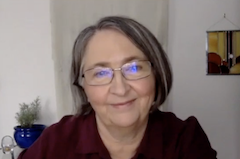This week I had my 67th birthday, my dog Shantih turns one, and I celebrated my one year anniversary of living in the forest at the ocean. This morning in daily practice we did a gratitude practice.
Neuroscience tells us we can change our brain when we focus on the good. We can do that, even as we acknowledge the complexity of our life and situation. We don’t have to suppress or turn away from the negative. We also don’t have to give it as much air time as it tends to get.
Our bodies store trauma. Knowing the sensations, feelings and energy in our body is a way to know our unconscious mind and primitive brain. We experience for ourselves that our cement shoulders are here to protect us, our teeth are clenched for good reason, and that heavy feeling in our chest or fist in our gut are trying to get our attention. Knowing why it is here, we might find ourselves tolerating or even welcoming the contractions that we previously resisted.
For a gratitude practice to be effective, we need to feel it in our body. We take in the good and feel it. And we widen our perspective and our capacity for what we are able to welcome.
Life isn’t a Disney movie or an after-school special where things always work out. Our parents don’t always change and acknowledge the pain and hurt of our childhood. The person who bullies our children or grandchildren probably won’t heal their underlying pain. They will likely continue. We can’t change the external circumstances. As much as we would love someone else to change, that isn’t in our control. It is up to them.
We acknowledge the beauty we see through our eyes. We also see suffering and ugliness through our eyes. Do we need to deny the suffering to enjoy the beauty? Can we allow the complexity to be here?
Black and white thinking is a specialty of our primitive brain. It is a blunt instrument without a lot of nuance. Our survival instincts and strategies will continue to force their way in until we feel safe enough to be okay without them.
Try a gratitude practice to acknowledge, encourage and welcome the strategies that arise to keep you safe. They are here because we need reassurance when we feel anxious or afraid. We are pretty sure that others will continue to hurt us and that we will need to defend ourselves.
Our nervous system is the way it is because of past experience. Reassuring ourselves is more effective at reducing fear and anxiety than being angry at ourselves that we still have fear, and that these old strategies still arise. Accepting more of reality is an important step in opening up to kindness and compassion for ourselves.


